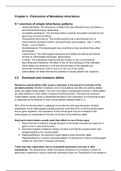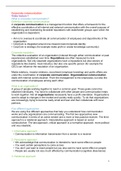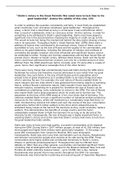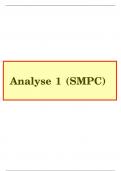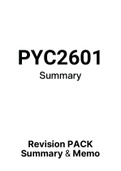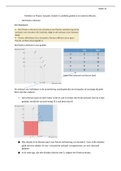Week 1 Module I: Global Legal Pluralism
LG1: Understand and apply the relation between legal order and the globalization
of inclusion and exclusion Week 1-5
LG2: Pick out and apply the constitutive features of emergent global legal orders
and how they relate to state law
Learning Goals
● Learning goals for Week 1
○ Learning goal I:
■ explain the historical context of globalization of law and the changes that
globalization has brought to the assemblage of territory, authority and rights
(TAR).
○ Learning goal II:
■ analyze an example case of recent legal developments from the perspective of
globalization as denationalization and the global TAR.
Global Legal Pluralism
● If states, during the so-called Westphalian paradigm of law, could lay claim to exclusive
sovereignty within their territories, globalization processes give rise to the fragmentation of law,
such that individuals and groups are the object of a plurality of overlapping, often competing,
legal orders. The first week introduces the notion of global legal pluralism, contrasting it to state
law in the Westphalian period.
● Globalization processes challenge the assumption that state territoriality is a constitutive feature
of legal orders. But does this mean that transnational and emergent global legal orders can move
beyond spatial boundaries that distinguish an inside from an outside? The second week unveils a
novel understanding of the (spatial) boundaries of legal orders that explains why and how all legal
orders, global or otherwise, include and exclude, thereby casting new light on the notion of global
legal pluralism.
Materials
The historical context of the globalization of inclusion and exclusion
, ● Study materials and tasks
○ 1 text by Saskia Sassen (about 40 pages)
○ 1 text by Peschard & Randeria (about 10 pages)
○ 1 Weekly Assignment, to be completed by Sunday, Feb 12th at 23h59 Dutch time
(voluntary)
● Study instructions
○ Read Saskia Sassen's text Sassen - A sociology of Globalization Download Sassen - A
sociology of Globalization
■ When reading this text, pay attention to (1) how Sassen critiques methodological
nationalism, and (2) how she defines and analyzes what she calls 'globalization
as denationalization'.
○ Read an excerpt from Karine Peschard & Shalini Randeria's text
Peschard&Randeria_Taking Monsanto to court legal activism around intellectual
property in Brazil and India.pdf Download Peschard&Randeria_Taking Monsanto to
court legal activism around intellectual property in Brazil and India.pdf. You are invited
to read the whole article, but only the pages 792-801 (until the end of section 3.1) are
obligatory.
■ The purpose of reading this article is not to educate you in international and
comparative IP law, but to offer an illustration of legal globalization, the way in
which national institutions respond to legal challenges presented by the actions
of multinational corporations on their territory — and how massive globalization
processes may be localized in such small thing as a seed. Read the text by
reflecting on in which ways the actions of Monsanto and the Brazilian courts
could be said to exemplify globalization as denationalization and the global
assemblage of TAR.
● Don't forget to participate in this week’s lecture and tutorial!
● Complete your Individual Assignment
Class Notes
● Cases
○ we the people of the amazon
■ pleading of a chief indigenous community for the care of the amazon as
paramount for the survival of the world
○ direct action by the karnataka state farmers
■ dependency of farmers to monsanto in regards to rice GMOs
○ the cochabamba battle for water
■ expensive contract of water with a multinational of the us that had a contract
policy that gave the company right to charge people for water rain
○ occupy wall street
■ failing system that was in direct denial of capitalization and global
● Introductory remark
○ intense resistance to globalization processes including the emergence of global legal
orders
, ■ globalization suggest that is law that covers the world law as a process of
inclusion and exclusion and it will create support and resistance
■ legal order that is a bit removed from international law
■ it has claim of autonomy into global state
■ trying to make sense of the global dynamics
■ by being included in the dynamics of global system they are being
included
■ like in the case of karnataka they were being excluded from their
territory by being made dependant to the monsanto seeds not
giving them autonomy
○ rough and ready definition of global legal orders
○ resistance to the dynamic of globalization
○ not merely inclusion and exclusion
● the dynamic of inclusion and exclusion of globalization is puzzling embarrassing and disturbing
○ puzzling due to territorial borders aren't primary source of inclusion and exclusion
■ borders shouldnt be the core of organization
○ embarrassing due to our theories about law have very little to say about boundaries
○ disturbing : are inclusion and exclusion linked to the globalization of capitalism ? or is
this a general feature of global law
■ bad guy is capitalism, elimination of capitalism and creation of a human right
guided legal order where you would exclude and include rights
■ rights such as right to live against rights of self determination in regards
to abortion
■ if every legal order leads back to exclusion and inclusion where is laws claim to
justice
■ how can we think of law as right and not might
● Main Aims
○ conceptual a model of legal order that can explain how and why global legal orders
include and exclude
○ empirical test the mode with a range of examples of emergent global legal order
○ normative how to deal with inclusion and exclusion? what sense to make of global justice
in the face of struggles about inclusion and exclusion
○ institutional what legal institutions are available to deal with struggles about global
inclusion and exclusion
○ each of the questions of the each will be answered based on the aims and centered around
the aims
● Structure of the course
○ global legal pluralism
■ contextualization the problem of globalized inclusion and exclusion
○ legal orders in global setting
○ resistance to emergent global legal orders
○ authority and struggles for recognition
○ global constitutionalism and its limits
● Historical context Three Assemblages
, ○ global inclusion and exclusion
○ comes from the westphalian paradigm
○ methodological nationalism
■ in the legal doctrine
■ in the legal and political theory
■ national law as the core of everything
○ historicizing the westphalian paradigm
○ a variety of approaches: post-national, trans-national, de-nationalization, globalization?
■ shows another approach where the state isn't the core of the legal system
○ The assemblages of territory, authority and rights (TARs) belong together
■ how are they intertwined and how that changes in regards to a global legal
system
■ different ways of articulating TARs
■ medieval
■ national
■ global assemblages
● Three assemblage
○ Medieval assemblage
■ Multiple systems of rule
■ feudal
■ church
■ as a system and political player
■ church as a form of rule throughout europe
■ empire
■ form of political rule
■ each of these systems were not united and something with friction
between each other
■ Territory
■ borders as we know them today weren't like that
■ there wasn't a system of rule of territorial fixity and exclusivity
■ church with power of territorial taxing
■ there were overlapping jurisdictions
■ Authority
■ feudalism was decentralized
■ church and empire centralized
■ core of church was rome
■ empire political]
■ church religious
■ limited scope of authority as a relation of rule
■ authority directly over people not over territory
■ regardless of who lives there
■ Rights(and obligations)
■ limited reciprocity of rights and obligations
■ rights related to status/class


